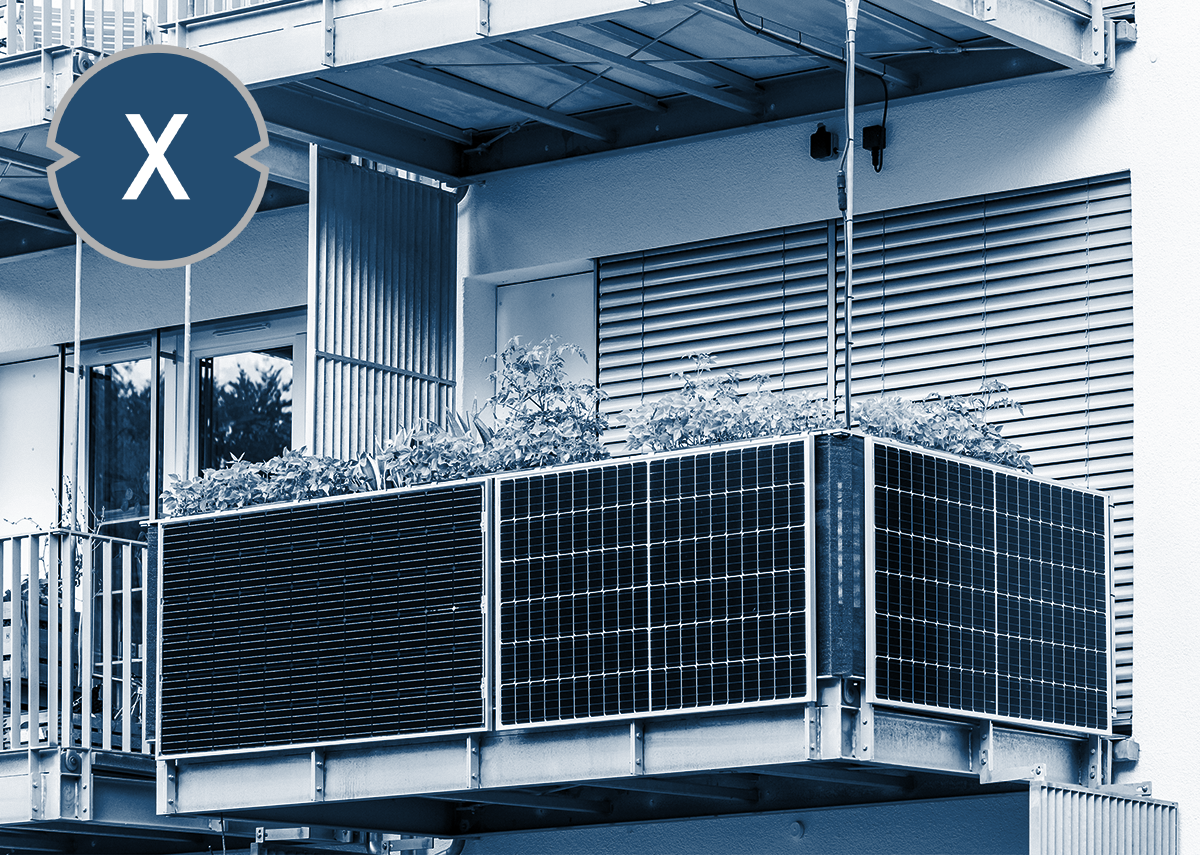
Balcony solar/balcony power plant: First draft for VDE product standard available – Image: Xpert.Digital / Mariana Serdynska|Shutterstock.com
Balcony power plant: The first draft of the VDE product standard is available
In view of high electricity prices, balcony power plants are becoming increasingly popular - around 200,000 devices have already been installed in Germany. To date, the available plug-in solar devices consisting of a solar module, inverter and connection cable have not been certified. The DKE has been driving development forward since 2017 and the draft product standard aims to enable safe operation for users.
Originally people spoke of guerrilla photovoltaic systems, but the market for plug-in solar devices is now developing dynamically. According to a study by HTW Berlin, a total of 128,000 plug-in solar devices were added in 2020 and 2021, generating a total output of up to 51 megawatts. The DKE has now presented a draft for a VDE product standard for the first time, which is entering the comment phase. While according to the study, 70 percent of the devices installed use the Schuko plug that is common in household appliances, the DKE has already pointed out in its installation standard for plug-in solar devices from 2018 that the mini PV systems are not household appliances.
Since the electricity is not only received but also fed in, the DKE recommends a special energy plug-in device or comparable concepts. This ensures that the electrical safety of the building installation is guaranteed and that the metal plug pins cannot be touched, thereby protecting users from electric shock. The more devices there are on the market, the higher the risk of damage can be - which is why a product standard that covers all safety aspects is urgently needed.
Aim of the product standard
There are two options for installing a plug-in solar device: It can be wired directly, which has to be done by a craftsman, or the connection is made by the user using an energy plug-in device. The draft of the new product standard takes up the topic of connectors again and explains that there are various options for making the type of connection safe. In addition, an informative appendix deals with the frequently used Schuko plug, which is currently neither permitted nor prohibited, in order to provide technical advice and resolve this gray area during the comment phase.
The aim is to comprehensively describe the technical safety requirements so that manufacturers and suppliers of such devices, who purchase individual components and market them as plug-in solar devices, can work with them. It also explains what needs to be taken into account with regard to the electrical safety of the building installation. The standard covers models that are fully assembled and can be installed directly, as well as the wide range of products that consist of one or two modules, an inverter and several cables.
In addition to the safety requirements, test criteria are described according to which devices can be tested in order to be able to prove electrical safety with a declaration of conformity. This means that end customers have transparent proof of the technical safety and quality of the purchased product. Finally, there is a compilation of what needs to be taken into account during registration and installation and what information needs to be made available to the end customer via documentation.
Comment phase and next steps
Due to the high relevance of the topic, the DKE is actively drawing attention to the start of the comment phase. The debate about the so-called energy transition for everyone is sometimes very intense, although the DKE would like to see an objective debate. “We have a current issue that is important for citizens’ personal energy transition. We want to shape this safely and advance it, with the greatest possible transparency in the standardization process. We therefore hope for active participation from the public,” says Alexander Nollau, head of the energy department at DKE. The DKE also has a great interest in accelerating the process.
After the comment phase, in which all citizens can participate, all comments will be processed, which may be followed by an arbitration procedure depending on the circumstances. The target for the final product standard is currently the end of 2023 - in which case no unplanned delays may occur. “And we can be reassured: devices that are on the market by then will not be affected by the product standard and can continue to be operated,” says Nollau.
- Plan photovoltaics for warehouses, commercial halls and industrial halls
- Industrial plant: Plan a photovoltaic open-air system or open-space system
- Plan solar systems with photovoltaic solutions for freight forwarding and contract logistics
- B2B solar systems and photovoltaic solutions & advice
That's why Xper.Solar for balcony power plants: 800W balcony solar with storage as a balcony solar system - advice and planning!
I would be happy to serve as your personal advisor.
You can contact me by filling out the contact form below. I will get back to you right away
I'm looking forward to our joint project.
Xpert.Digital – Konrad Wolfenstein
Xpert.Digital is a hub for industry with a focus on digitalization, mechanical engineering, logistics/intralogistics and photovoltaics.
With our 360° business development solution, we support well-known companies from new business to after sales.
Market intelligence, smarketing, marketing automation, content development, PR, mail campaigns, personalized social media and lead nurturing are part of our digital tools.
You can find out more at: www.xpert.digital – www.xpert.solar – www.xpert.plus
Xpert.Digital / Xpert.Solar and Alpha Solar & HeizungstechnikGmbH are partners
Xpert.Digital / Xpert.Solar works with Alpha Solar in the area of balcony solar and balcony power plants, solar fences, solar facades and solar walls for end consumers. The links marked *1 are so-called affiliate links. If you click on such an affiliate link and make a purchase via this link, Xpert.Digital / Xpert.Solar will receive a commission from Alpha Solar. The price does not change for you.

